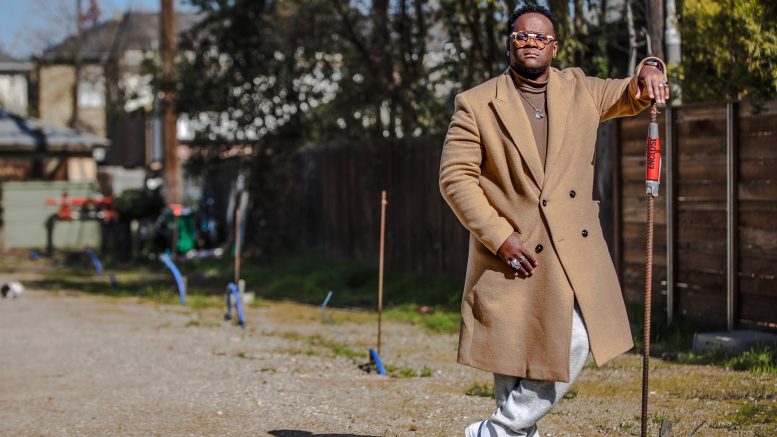It could be on the rise in the Capital Region through apps such as Cher
By Graham Womack
Roshaun Davis is looking around Sacramento for land to create a unique space.
Davis, 41, who co-founded Oak Park-based marketing and events agency Unseen Heroes, is attempting to build a live-work space for artists that would be called The Nest. What’s different about this project is that it would allow the artists to both live at and share ownership of the property. Davis got the idea through a developer, Julie Young, who had seen his company’s events get displaced multiple times.
“She’s like, ‘It’s not gonna stop until you start to own some stuff,’” Davis said.
Davis, who would like to own both a residential unit and a separate office space at The Nest, is part of a growing number of unrelated people looking to achieve ownership by joining others to co-purchase properties as their place of residence. Co-buying can be a lifeline for individuals or groups too often shut out of the housing market in the past, such as the Black community.
“African Americans and other minorities seem to be on the tail end of homeownership, so we have to look for a lot of different ways to be creative,” said Stephen Webb, a Sacramento-area Realtor for Keller Williams Realty and a past chapter president for the NAACP.
While the co-buying trend is not a fix-all for California’s housing crisis and has some challenges Webb and others have identified, proponents say there are also upsides that can help buyers traditionally shut out of the market achieve their dream.
How shared homeownership works
The concept of shared homeownership or co-buying properties isn’t necessarily a new one in the Sacramento area or beyond.
Groups of buyers have long joined forces to purchase investment properties or places they can use as vacation destinations, such as timeshares. Many first-time couples might also turn to a parent with better credit to cosign on a mortgage application and help them qualify, all three names sometimes appearing on a home title.
What’s been changing in recent years is people who might not be related or have a romantic connection are partnering to purchase properties that they live in together, parsing equity and sharing expenses. While a spokesperson for Sacramento County said via email that neither the recorder or assessor’s offices track data related to co-buying or shared homeownership, there are signs the trend could be on the rise.
One sign is a rising amount of legal paperwork associated with co-buying. Webb recommended that people entering into shared living arrangements draw up trusts “so that if something happens to a party, if you have a dispute that those disputes can be dismissed, dissolved.” One way to essentially do this is by creating what’s called tenancy-in-common, or TIC agreements, which can set parameters like what to do if one person wants to sell their part of the property a few years into the agreement and the other person wants to stay.
These agreements are on the rise, said attorney Jaclyn Powell, an owner of Sacramento-based Smith McDowell & Powell. “Honestly, I’ve seen more TIC agreements for … residential properties in the last five years than I have in my entire career,” Powell said. “So there’s obviously a movement toward that for couples or people who are not married and purchasing real estate and living together.”
The co-buying trend extends beyond Sacramento and properties zoned as duplexes. Hilda Schmelling, who grew up in Sacramento and now lives in Oakland, co-bought a single-family home with two separate living spaces with a partner and another couple. The other couple had debated moving to Sacramento for its cheaper housing prices than the Bay Area before the four decided to buy together.
“Once it became possible to do something as four people, then that obviously became a special way to feel more secure even staying here in a way that renting never did,” Schmelling said.
Locally, Tamika L’Ecluse, who is a member of Sacramento Investment Without Displacement, has seen shared homeownership or cooperative living arrangements work. “If we’re looking at generational wealth-building, this is one of those ways that really help families who have seen roadblocks and roadblocks to really be able to see their dream come to fruition,” L’Ecluse said.
In Midtown Sacramento, Austin Tran became a homeowner by using a relatively new application, Cher that bills itself as “the first real estate digital concierge helping renters earning low to moderate income achieve homeownership.” The company is in Sacramento as one of its first markets. And Tran used the app to co-purchase a Midtown duplex with someone he knew.
“I thought it was really easy,” said Tran, an electrical engineer in his early 30s. “They introduced me to different types of loans to get and using their process was simple, because it just provided one portal where I was finding this information and handing applications or my payments.”
Cher was founded in late 2018 and is based in Santa Monica; it now operates in the Los Angeles, San Francisco and Sacramento regions. According to marketing material by the company, it has experienced a 771% growth over the past six years “with roommates and friends buying homes together to transition from renting” and $330 billion total value of homes purchased among friends in 2021.
The company currently has a team of four working the Sacramento region and has done a handful of deals locally, said Eric Chebil, Cher’s founder and CEO. The app can do everything from helping to connect potential buyers to creating TIC agreements.
“In Sacramento with home prices going the way they are, we have seen definitely an uptick,” Chebil said. “But the word co-ownership is definitely still something new and we’re … providing a lot of educational background around co-ownership.”
The educational background is needed, with some potential pitfalls of shared homeownership.
The drawbacks of co-buying
While interest might be growing around the concept of shared homeownership, there are a limited number of organizations that can help make it happen, including the City of Sacramento.
Sacramento became the first city in California last year to receive a prohousing designation — meaning its working to reduce barriers to homeownership — from the California Department of Housing and Community Development. It has also been actively trying to boost the kind of housing stock that is seemingly best-suited for co-ownership through its missing middle study around two, three and four-unit properties.
But Sacramento’s outgoing Housing Policy Manager Danielle Foster, who started as executive director with the Capitol Area Development Authority on Feb. 1, said the city has no formal policy around co-buying properties.
“I think it gets a little tricky for the city to be involved because it really comes down to people choosing who they want to live with,” Foster said. “And much of that is personalities and people wanting to live together. It’s kind of a matchmaking, right? So it tends to be something that nonprofits will work in.”
Some of these nonprofits such as HomeShare American River appear to be focused more on helping homeowners find renters to help subsidize their rent, rather than bringing together co-buyers.
Cathy Creswell, Sacramento Housing Alliance board president, has her doubts about how effective shared ownership can be, too. “If I’m looking at, how do we get people into housing who’ve been shut out, most of those people need regulated, affordable, subsidized housing,” Creswell said.
Webb couched his words of encouragement about shared homeownership with concerns about making sure Black co-buyers were educated about what they were getting into and with the hope that they could stay in the properties for at least 10 years.
“You’re trying to build communities and things of this nature, instead of just having someone where an investor can eventually come in,” Webb said.
Matt Gougé, who runs the Sacramento branch of UMortgage, has his own reservations about co-buying, saying he personally would advise against family members or friends going in together on a house as partners on a deal. “It’s tough to divide real estate,” Gougé said. “And so while it is happening and I guess it’s going to be right for some people in some scenarios, I think that it’s likely something that could be a regret.”
Erin Stumpf, a broker associate for Coldwell Banker, said that while some potential buyers have approached her about buying together, no one’s gone through on a deal with her.
“What I would suggest to people thinking about entering into this arrangement is to get tax and legal advice,” Stumpf said. “Because again, there are several ways to hold title to a property. And while I talk to unmarried couples about buying property together, have a clear understanding of what you’re undertaking.”
Still, people like Davis are hopeful about what the concept might be able to do — and what past trends it might be able to help reverse.
“This starts at the home level,” Davis said. “If we don’t have a place in our neighborhoods that we own, we’re either getting high rent by folks who actually understand and will rent their house out at the highest value. Or we just get displaced.”
This story is part of the Solving Sacramento journalism collaborative. In 2023, we are focusing on finding solutions to the lack of affordable housing in the Sacramento region. Solving Sacramento is a project of the Local Media Foundation with support from the Solutions Journalism Network. Our partners include California Groundbreakers, Capital Public Radio, Outword, Russian America Media, Sacramento Business Journal, Sacramento News & Review, Sacramento Observer and Univision 19.







Be the first to comment on "Could shared homeownership work for Sacramento?"